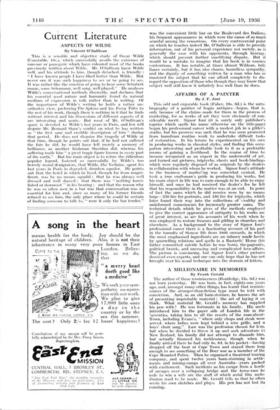Cuirent Literature
This is a sensible and objective study of Oscar Wilde (Constable, 10s.), which successfully avoids the extremes of rancour or panegyric which have coloured most of the books previously written about Wilde. Mr. O'Sullivan knew Wilde well, and his attitude to him, though detached, is friendly :
I have known people I have liked better than Wilde. But never one it was such happiness to see or be going to see. It was rather like the emotion of going to hear some Schubert music, some Schumann, well sung, well played." He analyses Wilde's conversational methods discreetly, and declares that his essential good nature and humanity found its natural medium of expression in talk rather than in writing. Of the importance of Wilde's writing he holds a rather un- orthodox view, preferring The Sphinx and his Fairy Tales to the rest of his work, though there is nothing in it that he finds without interest and his discussions of different aspects of it are interesting and acute. But most of Mr. O'Sullivan's space is devoted to Wilde's last years in Paris, and few will dispute Mr. Bernard Shaw's verdict on what he has written as the first sane and credible description of him " during that period. He does not disguise the tragedy of Wilde at that time, though he points out that, if he had not suffered the fate he did, he would have left merely a memory of brilliance, as another Irishman Sheridan did, whereas his suffering made bins " a great tragic figure known in every part of the earth." But his main object is to refute the ridiculous popular legend, fostered so successfully by Wilde's too fiercely moral denigrators, that Wilde, like Verlaine, spent his last years in Paris in degraded, drunken squalor. He points out that the hotel in which he lived, though far from magni- ficent, was by no means squalid ; that he was always well dressed and well shaved ; that there was " nothing humi- liated or downcast " in his bearing ; and that the reason why he was so often seen in a bar was that conversation was an essential for him and, since so many of his former friends refused to see him, the only place where he could be certain of finding someone to talk to, " were it only the bar tender," was the convenient little bar on the Boulevard des Italiens, his frequent appearances in which were the cause of so much scandal among the censorious. On every controversial point on which he touches indeed Mr. O'Sullivan is able to provide information, out of' his personal experience not merely, as is generally the case with his opponents, through hearsay, which should prevent further unedifying dispute. But it would be a mistake to imagine that his book is in essence contentious. It has notable, at times almost Wildean, bril- liance certainly, but it has also charm, boundless sympathy, and the dignity of something written by a man who has so mastered his subject that he can afford completely to dis- regard the opposition of those who though they may know that subject well still know it infinitely less well than he does.










































 Previous page
Previous page